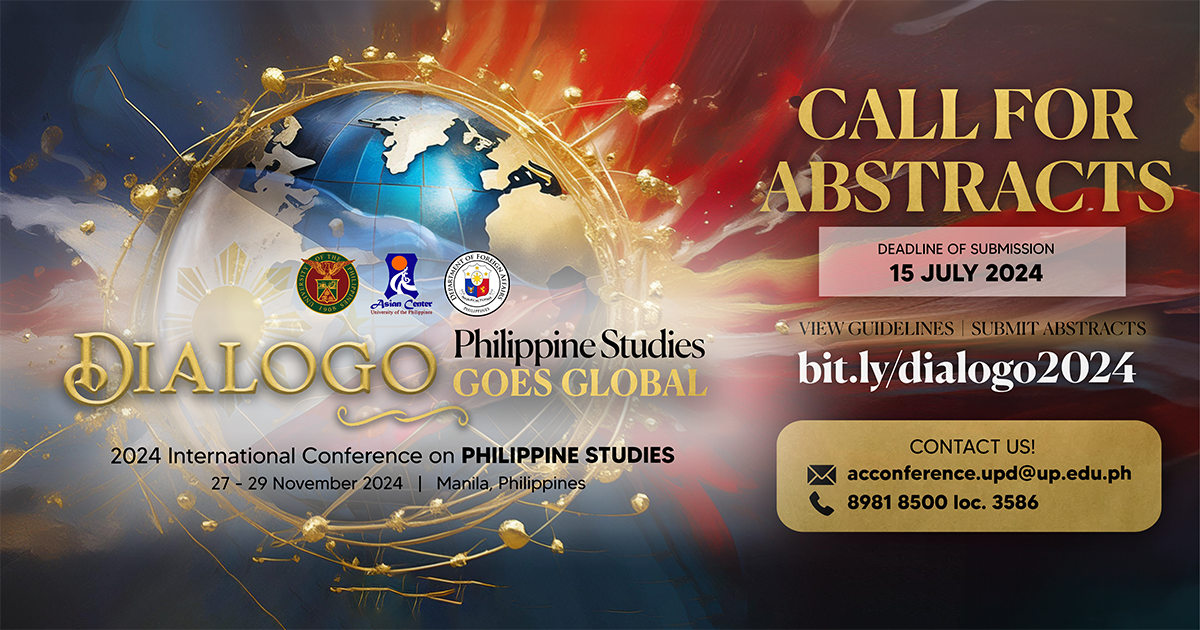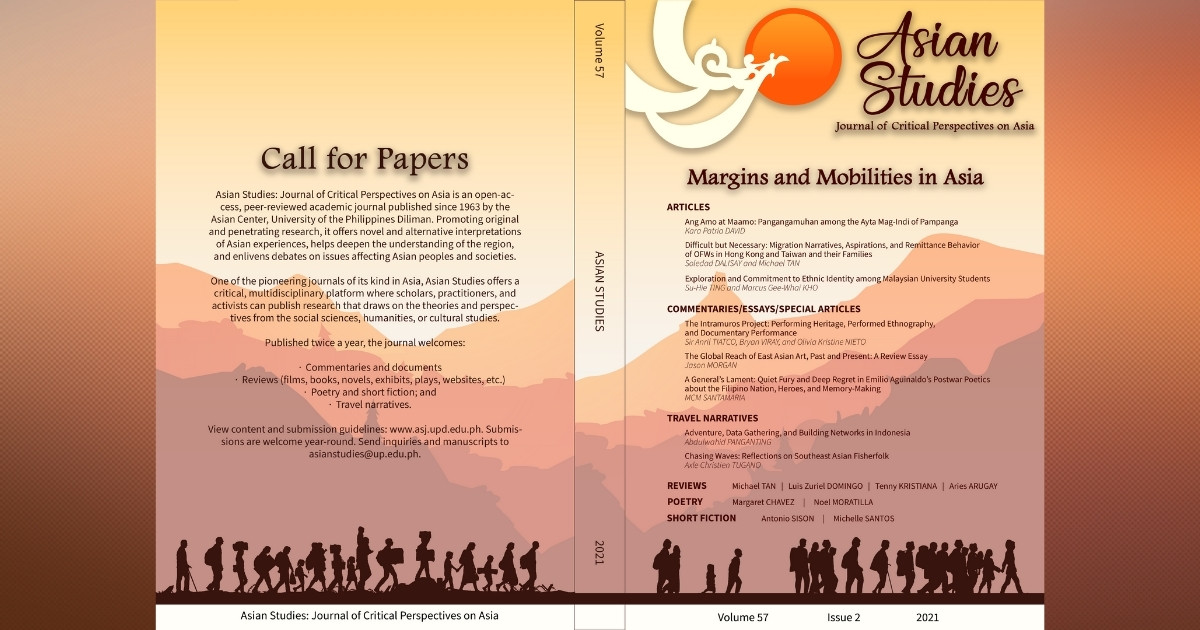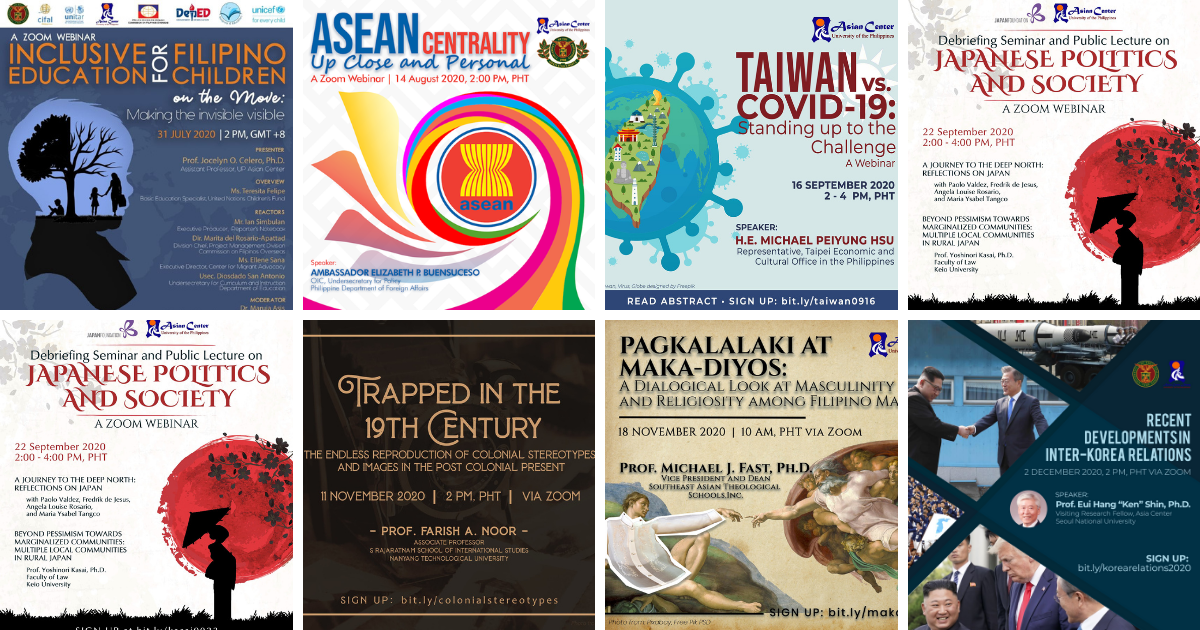The UP Asian Center, in partnership with the Office of Cultural Diplomacy of the Department of Foreign Affairs, is now accepting submissions for the 2024 international conference on Philippine Studies, Dialogo: Philippine Studies Goes Global. The deadline for submissions in English is on 22 July 2024. The NEW deadline for submissions in Filipino is on 9 August 2024.
ABOUT THE CONFERENCE
In an era of globalization, the increasing Filipino diaspora as well as the growing importance of the Philippines in regional and global affairs have raised international interest in the study of the Philippines—of its culture, language, history, state, and economy. As a result, foreign academic institutions, some spearheaded by Filipinos, have established platforms that advance education and research on the Philippines and promote intercultural understanding and policy dialogue on common issues among overseas Philippine and migrant or second-generation communities.
These Philippine Studies initiatives include establishing minor and major specializations in Philippine Studies, associate degrees, and certificate programs, research centers as well as Filipiniana materials repository and databanks. These endeavors emphasize the significance of Filipino representation and Philippine contributions to the development of multicultural communities and promoting heritage connections among people.
To build on the gains from these initiatives, the UP Asian Center in partnership with the Office of Cultural Diplomacy of the Department of Foreign Affairs is organizing the International Conference on Philippines Studies, Dialogo: Philippines Studies Goes Global. The conference aims to bring together the different Philippine Studies Programs abroad, on the one hand, and the academic and research programs on and in the Philippines, on the other hand.
OBJECTIVES:
With the proposed conference theme, “Philippine Studies Goes Global,” the Philippine Studies Abroad Conference aims to achieve the following:
• Initiate a dialogue among Philippine Studies scholars to promote indigenous knowledge production and enrich understanding of the Philippines through the various perspectives of global scholarship;
• Provide a platform where partner universities and programs can present their research and other unique initiatives related to Philippine Studies and explore future collaborations and exchange of best practices;
• Formulate policy recommendations for the government and academe to consider to strengthen further Philippine Studies as a program of study and research.
THEMES AND TOPICS
1. Decolonizing Philippine Studies
• Representations of the Indigenous in Specific Fields of Study
• Postcolonial and Decolonial Literature Research, Methods, and Pedagogies
• Gender Perspectives in Philippine Studies
2. Indigenous Knowledge Systems
• Environmental Knowledge and Community-Based Resource Management
• Indigenous Health Practices
• Ancestral Domains, Livelihood, and Land Rights
• State of Regional Studies in the Philippines (Cordillera Studies, Ilocano Studies, Mindanao Studies, Islamic Studies, Visayan Studies, Bicolano Studies, etc.)
• New Sources and Approaches for the Study of Philippine History
3. The Philippines as a Maritime, Archipelagic, and Island Nation
• Nationalism and the West Philippine Sea
• Role of Institutions in Maritime Studies
• Philippines in the Changing Geopolitical Architecture
4. Mindanao History and Culture
• Lumad Histories
• Early Mindanao Histories from Archaeological Perspectives
• Muslim Mindanao in the Context of the Malay World
• Muslim Filipinos
• Islamic Religious Flows and Mobilities
• Bangsamoro Governance, Resource Development, and Future Directions
• Identity, History, and Struggles
5. Intercultural Encounters, Diaspora and Migration
• Early Modern and Colonial Histories of the Philippines
• Encounters between Religion and Secularism
• Ethnic Identity among Migrant Filipinos
• Transnationalism and the Philippine Diaspora
• Overseas Labor Migration and Its Socio-economic Impact
6. Philippine Arts, Languages and Cultures
• Reclaiming Philippine Art, Cultural Heritage, and Tourism
• Emerging Directions in Philippine Arts and Culture
• Cultural Management and Preservation
• Material Culture
• Filipino, Regional Languages, and National Identity Formation
• Local and Global Perspectives on Heritage Politics
• Repatriation of Artifacts
• Sustainable Tourism
7. Philippine Governance, Institutions, and Political Economy
• Power Dynamics in Governance
• Civil Society and Social Movements
• Current Trends in Philippine Politics and Governance
• Land and Resource Rights
• Sectoral Development and Structural Transformation
• Interrogating Neoliberalism
• Digital Economy and the Role of the State
8. Foreign Policy
• The Philippines in a Multipolar World
• Security and Geopolitics in the Indo-Pacific
• Public and Cultural Diplomacy and Soft Power
• The Philippines and ASEAN
9. Energy, Environment, Climate Change and Disaster Management
• Disaster and Climate Change Studies
• Environmental History, Rural and Urban Development
• Resource Management
10. Gender, Health, Education, and Social Development
• Feminist Perspectives on Contemporary Issues
• Population and Development
• Philippines and Global Health
• Higher Education and National Development
CONFERENCE FEES
|
|
Early Bird |
Regular Price |
Professionals (International) |
70 USD(approx. 4,000 PhP) |
80 USD(approx. 4,500 PhP) |
Professionals (Local) |
50 USD(approx. 2,900 PhP) |
60 USD(approx. 3,450 PhP) |
Student (International and Local) |
FREE |
FREE |






